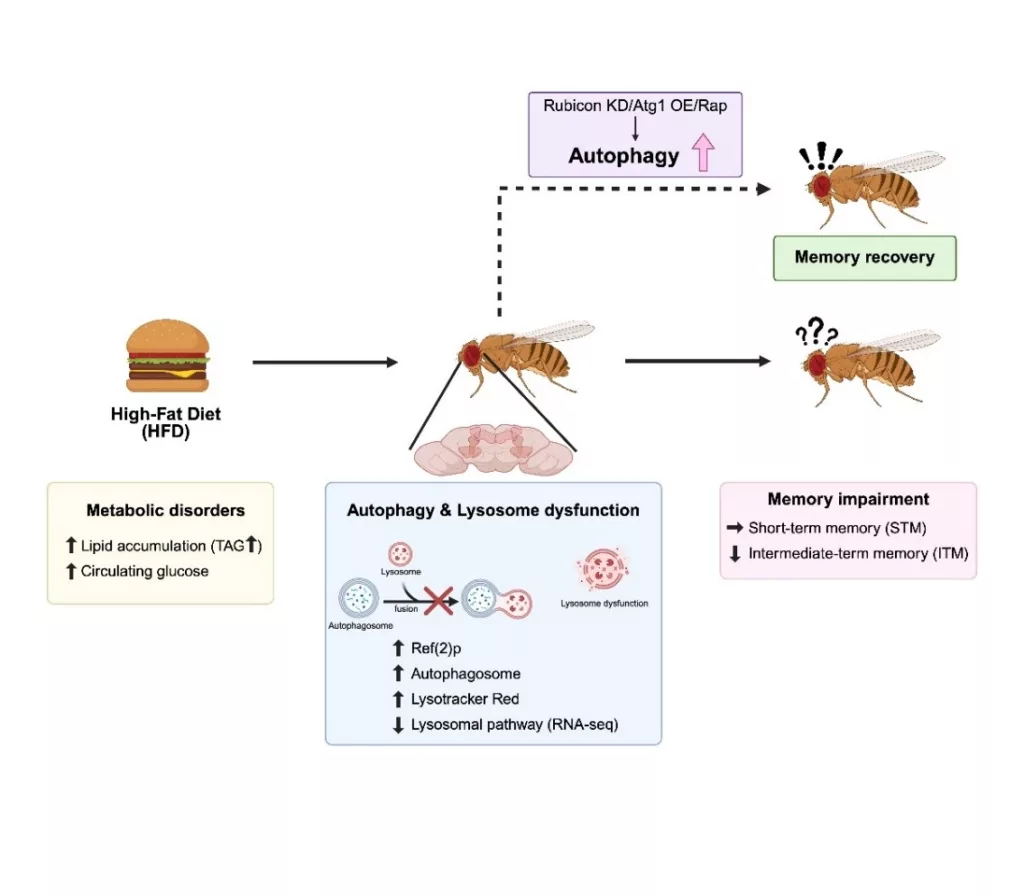Today’s fast-paced lifestyles and unhealthy eating habits are doing more than expanding waistlines; they’re also messing with our minds. High-fat diets (HFDs) are fueling a surge in obesity, diabetes, and metabolic issues, but they may also be quietly sabotaging brain health. In mice, these diets have even worsened signs of Alzheimer’s disease.
But how? That’s still a mystery.
One suspect is autophagy, the brain’s built-in recycling system. It clears out cellular junk to keep neurons healthy. When autophagy breaks down, brain cells suffer, leading to memory problems and neurodegeneration.
To crack the mystery of how high-fat diets (HFDs) affect brain health, scientists at Chiba University turned to an unlikely hero: the fruit fly (Drosophila). While rodent studies have zoomed in on specific brain regions, they’ve missed the bigger picture.
A healthy heart diet could reduce the probability of miscarriage
Why fruit flies?
They’re easy to tweak genetically, have a short life, so results come quickly. Their brains and bodies share key traits with ours, and yes, they can take memory tests!
By feeding fruit flies a high-fat diet, the team explored how it affects autophagy (the brain’s recycling system) and memory. These tiny insects are helping us understand how greasy meals might scramble our minds, and what we can do about it.
Researchers found that a high-fat diet (HFD) impairs intermediate-term memory formation in Drosophila by decreasing autophagic activity.
Eating fast food is associated with liver disease
Associate Professor Ayako Tonoki from the Graduate School of Medical and Pharmaceutical Sciences said, “Our findings suggest that diet-induced cognitive decline is not irreversible and may be improved by lifestyle interventions that promote autophagy, such as exercise or intermittent fasting. This research may raise public awareness about the cognitive risks of HFD and provide new insights into potential preventive strategies against metabolic and neurodegenerative disorders.”
Researchers fed fruit flies either a normal diet or a high-fat one for a week. The fatty diet caused a spike in fat (TAG) and sugar levels, along with increased fat buildup in their guts, indicating it disrupted their bodies’ energy handling.

Then came the memory test: flies were trained to link certain smells with a mild electric shock. Scientists checked their memory at three points: after 3 minutes (short-term), 3 hours (intermediate), and 24 hours (long-term).
Researchers trained fruit flies to link certain smells with a mild shock. Flies on a high-fat diet could still remember right after the test (short-term), but their memory faded after a few hours or a day, showing weaker intermediate and long-term memory.
Highly processed food can harm memory in the aging brain
To understand how high-fat diets (HFDs) affect memory, researchers looked at proteins involved in autophagy. A protein called Ref(2) piled up; usually, it gets cleared out. The Atg8a-II/I ratio, a sign of recycling activity, dropped.
Together, these showed that autophagy wasn’t working properly. Next, they temporarily blocked an autophagy protein called Atg1 in adult brain cells. Result? Flies lost intermediate memory, similar to those on the fatty diet, indicating that even brief periods of autophagy impairment can negatively impact memory.
But here’s the good news: When scientists boosted autophagy by tweaking genes or using the drug rapamycin, the flies’ memory improved. So, the damage from fatty diets isn’t permanent. With the proper cellular cleanup, brains can bounce back.
To dig deeper into how high-fat diets (HFDs) disrupt brain cleanup, researchers examined the final step of autophagy, where recycling bubbles (autophagosomes) fuse with waste-processing centers (lysosomes) to form autolysosomes.
In flies fed a fatty diet, they found plenty of autophagosomes and lysosomes, but not enough autolysosomes. That means the fusion step was broken, leaving cellular junk stuck in limbo.
Gene tests revealed that key lysosome-related signals were dialed down in these flies. And when scientists blocked lysosome function directly, the flies’ intermediate memory (ITM) dropped, just like with the fatty diet.
The study reveals how high-fat diets (HFDs) can disrupt the brain’s recycling system, autophagy, and lysosomal function, leading to memory loss. But it also offers hope: by understanding these mechanisms, scientists may find ways to prevent or reverse cognitive decline before it spirals into neurodegenerative disease.
Dr. Tonoki concludes by saying, “This research advances our understanding of how dietary habits influence brain health. Our findings may also accelerate the identification of autophagy-enhancing interventions—including specific nutrients and therapeutic agents—to combat diet-induced cognitive decline and preserve cognition in the aging population.”
Journal Reference:
- Tong Yue, Minrui Jiang, Kotomi Onuki, Motoyuki Itoh, Ayako Tonoki. High-fat diet impairs intermediate-term memory by autophagic-lysosomal dysfunction in Drosophila. PLOS Genetics. DOI: 10.1371/journal.pgen.1011818
